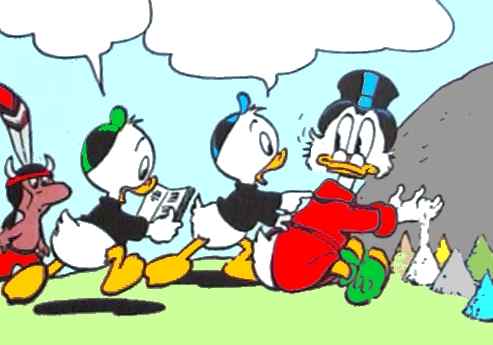 |
|
U$18
Land of the Pygmy Indians - 1957 Synopsis:
Scrooge longs for some peace and quiet so he
buys a large, remote area to enjoy its
tranquillity. But the land is inhabited...
Comments:
This was one of the first ecologically
founded stories in the comic book world, and it
was close to Barks' heart, because he was always
an environmentalist. Later on, Barks would make
harsh comments on the way we treat the
environment in his stories, culminating in the
early 1970s when he wrote biting environmental
stories about the decline of ecology for the
Junior Woodchucks magazine (see more HERE).
Barks' comments:
On comparison with FC0062 Mystery of the
Swamp: I realized that only the plotline
was similar; all other elements were breaking new
ground. Besides, the pygmy Indians were more
believable and interesting than the Gneezles, so
I went ahead with the story and let the gags fall
where they might.
The ducks were always peewees in comparison with
the villains. In order for them to become a
menace, they had to come up against somebody
smaller.
Barks added great ambiance to the Peeweegah
Indians' speech by letting them speak in
pentametres, a type of poetic verse borrowed from
Henry Wadsworth Longfellow's epic The Song of
Hiawatha: About the 8th grade, I had to read it
and recite it in school. I thought it was a
tiresome way of telling a story back then, but
the meter lends itself very well to the comments
of the Peeweegahs when they talk about what they're
going to do.
|